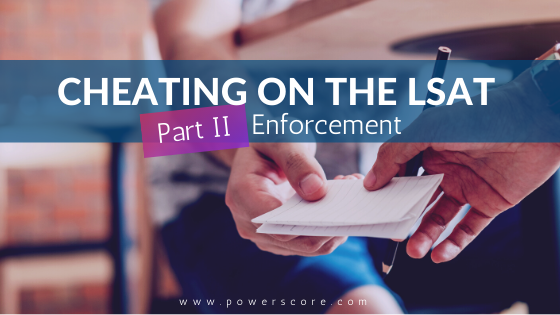Part 1 of this blog can be found here.
LSAC Cheating Prevention Protocols
To prevent cheating, over the years LSAC has gradually tightened restrictions on test takers in test centers (picture ID, no cell phones, etc.) These protocols are in place to help assure LSAC that you are who you say you are, and that you can’t easily communicate with other test takers during the exam. But the security measures don’t stop there. LSAC has also contracted Caveon Test Security as their test security vendor.
What Does That Mean?
In a concerted effort, LSAC and Caveon look for all of the other ways that someone might cheat on the LSAT. These efforts include:
- Monitoring and Patrol: Monitor chat boards so that confidential information is not disclosed, and monitoring web sites that might contain stockpiles of post-test information.
- Data Forensics: Statistically analyzing test results for patterns of cheating by individuals, at test sites, and across regions.
- Investigations: Looking into any suspicious activities at test sites or by test takers.
In other words, they watch what you say after the test, analyze all test results for suspicious activity (such as extremely high score increases, or specific test centers having unusual results), and physically investigate those incidents and others. So, if you cheat on the LSAT, you might find yourself under investigation and questioned about aspects of your performance.
What Happens Then?
Well, it depends. When LSAC launches an investigation into your score, your results are put on hold as they look into what occurred. This usually starts with a notice to you, along with a request for your response to the issue. Depending on the severity of the issue, your response may be enough to resolve the issue. Or it might escalate into a full blown security review. This could end with the cancellation of your score and you barred from taking the LSAT again, or worse.
So, What’s the Bottom Line?
The best approach is to avoid dishonest short cuts. Focus on buckling down and studying hard to get the score you need.


Leave a Reply